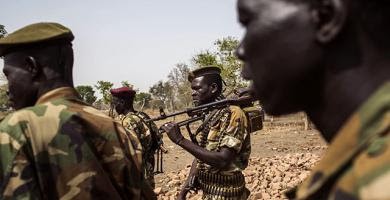 Skirmishes between South Sudanese government and rebel forces have continued despite a January cease-fire, but a renewed offensive by the rebels to recapture Malakal, the capital of Upper Nile state, marks a return to more intense military confrontation.
Skirmishes between South Sudanese government and rebel forces have continued despite a January cease-fire, but a renewed offensive by the rebels to recapture Malakal, the capital of Upper Nile state, marks a return to more intense military confrontation.
Malakal is located in southwest Upper Nile, which is the country's most significant oil-producing state. The fighting will complicate a peace process that had already stalled. The government may refuse to cooperate with rebel leader Riek Machar, the country's former vice president, if he ordered the assault to improve his side's bargaining position. At the same time, if Machar did not order the offensive, Juba would no longer view him as a valid representative of the rebels.
The offensive is unlikely to directly affect oil production in Upper Nile state. However, it could increase regional support for military action against the rebels. At the very least, South Sudan's military will need to consolidate its forces in the area to maintain control of Malakal and regain the advantage.
Fighting has been taking place near Malakal since Feb. 16 as rebels some 8 kilometers (5 miles) from the city prepared for the offensive, military sources said. Purportedly under the command of Gen. Gathoth Gatkouth, who commanded rebels in the battle for Malakal in January, the rebels have claimed partial control of the town. The latest reports indicate that the fighting is ongoing.
The negotiations in Addis Ababa fizzled over the past month. After a cease-fire was signed in January, violence dropped off, and with it went the pressure to reach a diplomatic solution. No real progress has been made beyond the cease-fire, and the tribal conflict underlying the deep political rift has not been addressed in any way. Efforts to resolve the rebellion, including releasing political prisoners and discussing the formation of a more inclusive government, have resulted only in limited government interest.
Control of Malakal, and more important the state's oil fields, would be a boon for the rebels, who currently have little to barter with other than the existence of their rebellion. After government forces regained the advantage in Bor and Malakal in January, the rebels were forced into the cease-fire; they lacked any strategic terrain that would strengthen their position in negotiations. The rebels could be trying to change that with the offensive in Malakal. If so, they may have damaged the foundation on which the mediation efforts were established, increasing the likelihood that both sides will focus on military rather than diplomatic victories.
The fighting could also be a sign of the limited control Machar has over the armed units he represents. Persistent skirmishes since the cease-fire had already revealed the inability of both sides to fully restrain their forces, but the execution of an all-out offensive could do irreparable harm to the status of Machar and his negotiators as legitimate partners in the peace process. The South Sudanese government may find it more productive to focus on military solutions -- with Uganda's support -- or it could engage in direct negotiations with local rebel commanders instead of Machar and his political allies.
If rebel negotiators are unable to rein in their troops or if mediation fails completely, there could be wider support in the region for military action. Several East African countries have threatened military action against the rebels in the past, but only Uganda has followed through. Uganda has conducted several airstrikes on rebel positions near Malakal in response to the offensive. No Ugandan ground troops are located in Malakal, but with air assets forward deployed in Juba, the country can deliver critical support to even the more remote areas of South Sudan.
The Malakal offensive has also rekindled fears about disruptions in oil production in Upper Nile state. The oil facilities, which are responsible for the majority of South Sudan's production, are about 140 kilometers north of Malakal. Previous fighting for Malakal did not disrupt oil production in that part of the country. There have been reports of smaller skirmishes near the oil facilities, but these involve small pockets of defected troops loyal to Machar. Local garrisons have repelled them several times, and they are unlikely to mount a serious threat. The Upper Nile oil facilities are also relatively self-contained, with housing facilities and an airfield located close to the production sites, limiting the effects of insecurity in the state on their operations.
South Sudan is a young country without a dominant ethnic group. Even President Salva Kiir Mayardit's Dinka tribe makes up only about 35 percent of the country's population. Right now Machar is something of a magnet for all groups that oppose Kiir; Machar belongs to the Nuer tribe, which constitutes about 15 percent of the population. But the smaller ethnic groups have wide-ranging interests, and it will take time for a dominant leader to emerge who can work around the ethnic distinctions. South Sudan has many issues to overcome, and fractures on both sides of the conflict will likely lead to prolonged unrest.
Courtesy : Stratfor (www.stratfor.com)